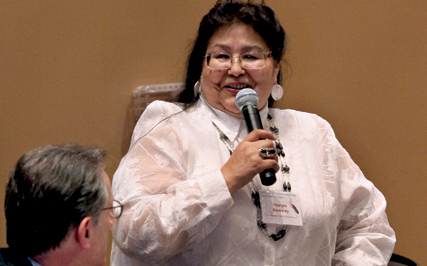Health & Education
Frustrated Tribal representatives consult with HHS

The primary concern of Northwest Tribes at the June 7 U.S. Department of Health and Human Services Region 10 Tribal Consultation was the federal government's failure to consult meaningfully, in a timely manner and, under some circumstances, a failure to consult at all about concerns going back 30 years.
"Everything is not rosy," said Tribal Chairwoman Cheryle A. Kennedy during a break in the proceedings.
She points to Oregon HB 3650, Oregon Healthcare Transformation, a bill that would revamp health care in the state by pooling federal and state Medicaid funds for distribution to local "community care organizations" (CCOs) that would deliver preventive care in the community. Savings, under the plan, go back to health care providers as an incentive to keep costs down.
The problem for the Grand Ronde Tribe, and likely others, is that the bill puts eligibility requirements in the hands of the CCOs and takes it away from the Tribes.
"We should be able to determine eligibility," said Kennedy.
"We're asking you to consult with the Tribes before decisions become law," said another Tribal representative, "so we can be up there fighting for the language we need."
The date for this sparsely attended Tribal Consultation, held this year at Spirit Mountain Casino, had been changed at least twice.
Though comments during the meeting showed that many Tribes fault federal agencies for working with the states and through the states on Tribes' behalf, Tribal and federal staffers alike point to the state as the problem.
"There's a long way to go," said Jay Angoff, Senior Adviser to Health & Human Services Secretary Kathleen Sebelius. "Dealing with the states is difficult for the Tribes and it is for us, too."
The feds have leverage, however, to withhold approval for waiver requests from states that do not consult meaningfully with Tribes.
Take the Health Care Transformation bill that, if passed in the state Legislature, will require federal waivers.
Oregon state advocates at the Oregon Health Plan are pushing to have the bill approved by the Legislature's close, likely later this month, but consultation with the Grand Ronde Tribe is not scheduled until July.
"What do you do when states ignore Tribal needs?" asked Angoff. "If you've got a solution, let me know."
Kennedy, who serves on the federal department's Tribal Advisory Committee, "put this issue on the table" a few weeks ago in a meeting with the Sebelius.
Sebelius assured Kennedy that without state cooperation with the Tribe, "the waiver will not go through," Kennedy said.
Kennedy also has been active at the state level.
"There is a meeting being set up (with Dr. Bruce Goldberg, director of the Oregon Health Authority)," she said. "We will get an audience."
Because much federal funding for Tribes goes through the states, Tribes are often left trying to nail down two moving targets to bring the dollars the last mile out to the reservation.
In many instances, Congress appropriates money for Tribes but it never arrives. In Washington state, of $24 million allocated for implementing health care reform, Tribes received $30,000, noted a Cowlitz Tribal member.
The long trail of broken promises is not lost on the federal agency, either.
"It's almost like 'Groundhog Day'," said Gene Frogge, Deputy Regional administrator for Region 10 of the Centers for Medicare and Medicaid Services, referring to the movie where a weatherman wakes up every morning to the same Groundhog Day. "We're hearing the same issues over and over. That big push (to deal with these issues) never seems to get there."
Frogge was among at least three top Health & Human Services officials who said they now are taking seriously the federal commitment to consult meaningfully with Tribes, and promised better in the future.
Region 10 Director Susan Johnson said that in the last year, the department had started tracking progress on the issues raised in previous consultations.
Tribal representatives also called on the department to ease expensive and time-consuming bureaucratic requirements.
The effort to move clinics to electronic health reporting is a case in point. Many Tribes face technical hurdles, like incompatible software, in collecting and maintaining this data.
"All the administrative costs are killing our people," said one Tribal representative.
Many said that Tribes ought to be exempted from anticipated budget cuts from the department. Even without cuts, they noted, federal inmates have twice the health budget of Tribal peoples. In addition, 35 percent to 40 percent of Indians are without health care insurance, more than twice the national average.
Tribes are continually seeking updates - unsuccessfully, a Tribal staffer said - on what health care reform will mean on the reservations.
Johnson said she took 20 pages of notes during the meeting.
"I'd like to see a model of what it would take to bring Tribal health up to the level of the rest of the country," said Kennedy. "It's time we address that. Just saying that the care should be 'culturally appropriate' doesn't mean much.
"I believe the task of consultation is to remove barriers," she said.
The 10-hour Consultation included discussions and updates of the 2010 federal Patient Care and Affordable Care Act, the Centers of Medicare and Medicaid Services, Child and Family Well-Being, Elder Well-Being and Indian Health Services.
Tribal Council member Wink Soderberg gave the invocation, and Tribal Executive Officer and Tribal member Chris Leno ended the session.
